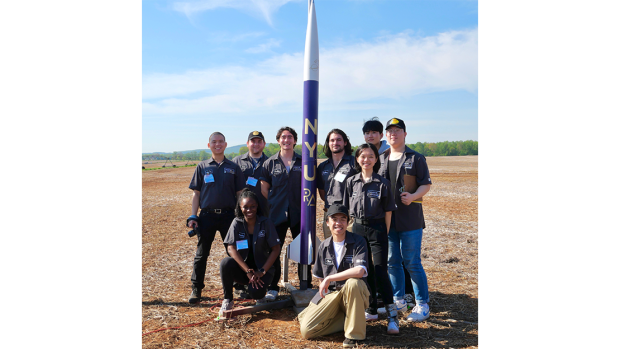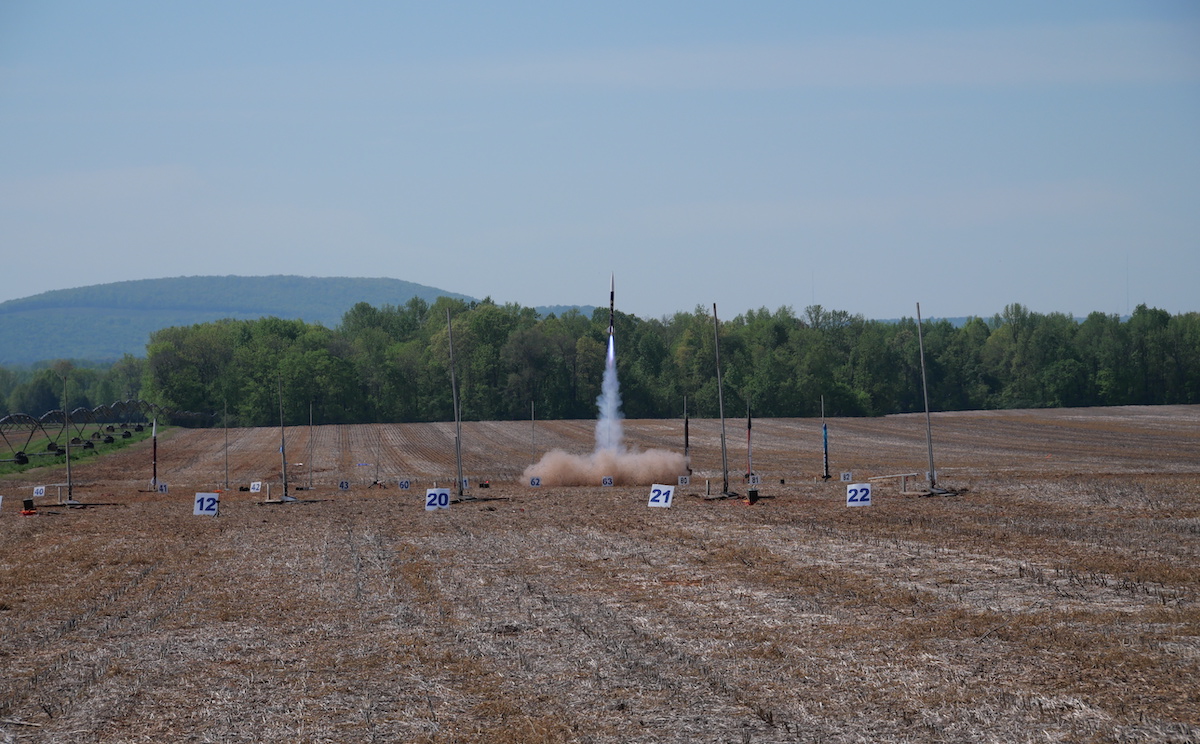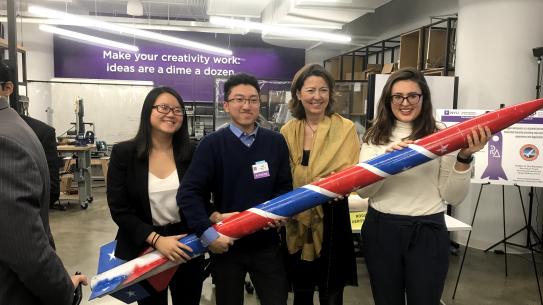NYU Tandon’s rocketry team triumphs for the third consecutive year

NYU Tandon’s Rogue Aerospace rocketry team won the Reusable Launch Vehicle Award at the annual NASA Student Launch competition.
One of the hottest current topics in the aerospace sector is reusable launch systems, which enable important rocket components to be recovered and put into service again, significantly reducing the costs of space exploration.
This year, for the first time, NYU Tandon’s Rogue Aerospace, a rocketry team that’s part of the Vertically Integrated Projects program, won the $1,000 cash prize that comes with the American Institute of Aeronautics and Astronautics (AIAA) Reusable Launch Vehicle Award. That award is a component of the annual NASA Student Launch, a research-based, experiential project that invites colleges and universities across the nation to design, build, and fly payloads or vehicle components over the course of several months and then compete for various honors.
Built around actual NASA missions and needs, the Student Launch begins with a highly selective proposal process, followed by a series of reviews that mirror the NASA engineering design lifecycle — from the preliminary design review to launch readiness to post-launch assessment–and provide an experience that prepares interested students for NASA’s Human Exploration and Operations workforce.
Rogue had been named the number-two rookie team of the year in 2021 and garnered first place in the Project Review Award category as well as being named the Overall Winner of that year’s Design Division — an honor that came with a $2,500 prize. In 2022 they took home a slew of honors, including the AIAA Vehicle Design Award (Design Division), Project Review Award, and overall Design Division second place.
This year, however, marked the first time the still relatively new team took part in the actual launch event, held in Alabama, where in addition to garnering the Reusable Launch Vehicle Award, they placed eighth overall.

“We owe enormous thanks to the VIP program; the MakerGarage and MakerSpace staff; the entire Department of Mechanical and Aerospace Engineering (MAE); Vice Dean of Research, Innovation and Entrepreneurship Kurt Becker; and Dean Jelena Kovačević for their continuous support in helping us represent NYU-Tandon so well three years in a row,” Professor Rakesh Kumar Behera, the team’s advisor, want to specifically thank the MAE department and the Deans office for the NYU-Tandon MAE Undergraduate Students Team (MUST) Competition Accelerator Program Seed Grant. Professor Behera said “The MUST grant allowed more junior team members of Rogue to participate in the in-person launch event in Alabama. As most of these junior team members are expected to continue with the team and compete in similar future competitions, the exposure we have gathered with the MUST grant this year will be invaluable for our team going forward.”
Zoe Leung, Rogue’s co-president, is ready for that challenge: “This year really pushed us to constantly think on our feet and fight for every point, and that mentality lasted right up until our post-launch report,” she said. “Going through the full competition cycle helped us understand where we should focus our efforts next season to get the results we want without burning out.”
“It was deeply satisfying to be able to assert ourselves as a competitive team and to perform so well in our first showing at an in-person launch,” Madeline Lyons, the group’s payload engineering director, added.
While undeniably fun, the event serves a serious purpose. “Our students share unique perspectives and design innovative technologies to address real-world difficulties of space exploration,” said Kevin McGhaw, director of NASA’s Office of STEM Engagement for the Southeast Region. “As NASA celebrates its 23rd year of Student Launch, we are proud to help develop the next generation of skilled engineers and explorers capable of supporting NASA’s Artemis missions.”
Professor Behera said. “We are already getting started with our preparation for the 2024 NASA Student Launch, and we aim to perform just as well or even better as the team evolves.”


